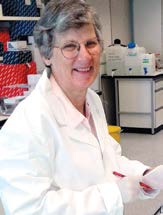
CS: A large part of your work as a scientist deals with the unknown. What have you learned about the process of asking questions?
NR: I have found that the most interesting discoveries emerge from exploring the peripheral issues of straightforward questions. This requires an open mind and attention to what looks odd. When I began my Ph.D. research in immunology, I was studying how lymphocytes cause tissue damage and I discovered a soluble, secreted factor called lymphotoxin. Up until then, it was thought that such cells exerted effects mainly by cell-to-cell contact. I was even more shocked when, many years later, while studying mice produced by a colleague, I realized that lymphotoxin actually induces lymphoid organ formation! My colleague had expected an entirely different result, but by approaching his mice with an open mind, we were able to contribute to a completely new area of immunology.
CS: Our faith is full of beautiful teachings. What is one doctrine of the faith that you appreciate or live out on a daily basis?
NR: Growing up, I looked to the Church for stability. I appreciated my father’s faith, and a friend’s mother was inspirational in her example as a strong Catholic woman. I have always been fascinated by the idea of vocation—and, for me, this grew into a deeper understanding of fulfilling our potential as Christians in work, relationships and everything that we do.
In my adult life, my understanding of Church teachings evolved. As Fathers Russell and Beloin preached Christ’s words regarding compassion, inclusivity and the value of relationships, I came to appreciate more fully the Church’s teachings on social justice.
CS: Leisure allows us to wonder at the world anew. How do you spend your leisure time so that you come to see the world in a new light?
NR: I love to garden. It allows me time to myself to bring order and beauty to the world by weeding, planting and cutting flowers. Everywhere I go, I pull weeds; it’s almost a compulsion! I also appreciate the beauty of the ocean. My late husband and I sailed together throughout
our marriage beginning even before our engagement. We owned our sailboat for forty years and spent a great deal of time on or near the water. The expanse of the ocean gives me a great sense of the familiar as well as the transcendent.

Nancy Ruddle is known for her discovery and analysis of lymphotoxin, a protein producted by T cells that play a role in the protective immune system and destroys tumor cells.
To learn more about Dr. Ruddle, visit: https://publichealth.yale.edu/people/nancy_ruddle.profile